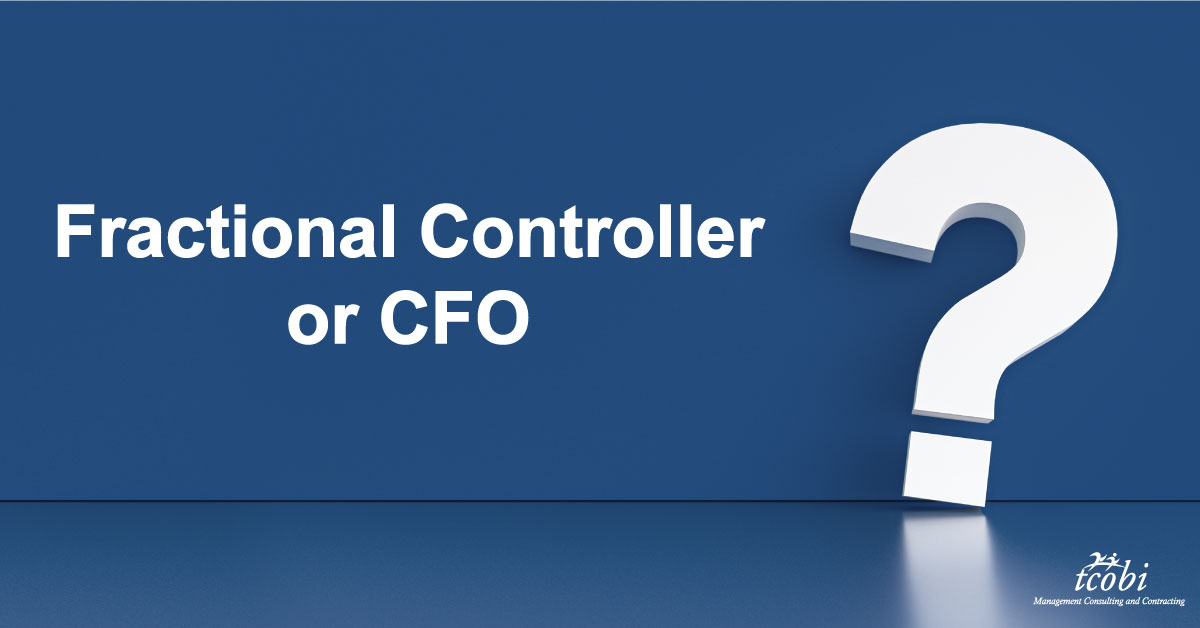Those in leadership and executive positions are always there when those…

What is a fractional controller or CFO?
New clients often ask me two questions when we first meet: what is a fractional Controller or Chief Financial Officer (CFO), and what do you do in each role? Here is a brief guide to the world of fractional executives generally and fractional controllers or CFOs more specifically.
The World of the Fractional Executive
A fractional controller or CFO is an executive-level professional who offers their experience, expertise, and skills to organizations on a for-hire basis (as distinct from recruiting and hiring a permanent employee). This relationship is usually managed through an individual consulting contract or through a company specializing in providing fractional pieces to any organizational puzzle.
Typically, fractional executives have worked for a significant number of years in the role they are hired for, which range from Chief Executive Officer (CEO) or CFO to Vice-President or Director. Their skills might be focused on one aspect of a business (Merger and Acquisition, for example) or can be much broader, depending on the experience they have accumulated over the years.
This overview is not to suggest that fractional executives are consultants in the familiar sense of the term. While they do offer a high level of practical experience and technical knowledge, they also take on a more active leadership role than a traditional consultant. In this sense, a fractional executive is a kind of hybrid position, providing a consultant’s elite services along with the leadership and executive insight of a permanent hire. Due to this distinctive position within a business, fractional executives will frequently self-identify in several ways: as an Interim Executive, Contract Executive, Temporary Executive, On-Demand Executive, or even Executive-as-a-Service (EaS).
In my case, the fractional journey has been along a wider path. I have worked for large multinational corporations and smaller, regional companies. I have worked in an eclectic mix of industry sectors, including manufacturing, mining, food processing, social services, business analytics, and social services. I have provided leadership and oversight on enterprise-scale IT conversions and managed detailed re-work initiatives to correct previously mismanaged system upgrades and installations. On each project, I brought a unique collection of skills and knowledge to the table: of financial systems, compliance and regulatory issues, project management, business intelligence systems, and risk assessment and management. Each of these projects brought with it new opportunities, idiosyncratic challenges, and impactful benefits to the business that hired me. Most importantly, every project successfully aligned short-term changes with long-term organizational goals, which, in the end, is the outcome that every fractional executive sets out to achieve.
Benefits of Hiring a Fractional Executive
Some of the more apparent benefits of hiring a fractional executive include but are no means limited to:
- cost-effectiveness through reducing the benefit-based overhead that can become onerous when hiring for senior executive roles
- as-needed or just-in-time access to expertise, often in support of project-based or organizational change or transition, which enhances organizational agility
- cross-sector experience give fractional executives a unique perspective on business problems and solutions, which can help a business from trying to reinvent the wheel when confronting familiar challenges
- organizational sustainability, whether this means negotiating a critical merger or acquisition, or ensuring that the next generation of organizational leaders are trained and ready for sustained strategic growth
- laser focus on results and outcomes since fractional executives are hired to complete a specific task or solve a particular problem.
The Role of a Fractional CFO and Controller
Although the roles of a fractional CFO and Controller are related, they are not identical. Knowing what to expect from each is crucial when considering bringing a fractional executive into your business.
Like a permanent-hire counterpart, a fractional CFO is a strategy focused executive who is responsible for
- ensuring the short- and long-term financial health of a business
- overseeing and addressing issues related to the capital structure of a company to ensure an optimal balance of debt, equity, and internal financing
- developing economic strategies and forecasts
- a multitude of additional duties, including reporting, compliance, merger and acquisition, and managing a company’s investments.
CFOs might also be asked to manage staff in finance-related teams, set and track financial goals and indicators, and take an active role in building and monitoring organizational budgets.
A fractional Controller has a more specific task than a CFO: to oversee the accounting operations of a business and its subsidiaries. Duties can include:
- managing all accounting records and producing detailed financial reports, which are especially important for publicly traded companies
- ensure the business is compliant with generally accepted accounting principles (GAAP) as well as all local and federal laws
- overseeing all parts of a business involved in the accounting processes, including payroll, inventory, accounts payable/receivable, and cash management.
- build and monitor organizational budgets, with a keen eye on ensuring that expenses are kept within projected parameters and debt is serviced according to best practices.
The essential skills in both fractional positions are similar: exceptional numerical proficiency, problem-solving and leadership skills, and the ability to explain complex concepts in terms that non-financial people will understand clearly.
Conclusion
Knowing what you need in terms of fractional support is only part of the formula. Knowing when you need the expertise of a fractional CFO or Controller is the other. A fractional financial executive will bring value to a business that is:
- looking to scale growth and needs expertise in financial planning and risk assessment
- entering a funding round and needs support in pitching investors and institutional lenders
- negotiating an unforeseen financial crisis (like a pandemic)
- facing a sudden or unexpected resignation of your current CFO or Controller with no clear succession plan in place
- initiating a transition or change team as a business pivots toward new opportunities
- not yet sure of the need for a new or continued full-time role.
Regardless of the route your business chooses, a fractional CFO or Controller is a sound investment. A fractional executive provides dynamic expertise to a company, delivering results quickly and cost-effectively. Working within a narrow and clearly established set of expectations, he or she will come up to speed quickly and work effectively with your existing leadership team to reach their outcomes while keeping billable hours as low as possible. The next time your business requires expertise not available in house, consider the option of a fractional executive before hitting autodial to your usual executive search firm.



